|
|
|


|
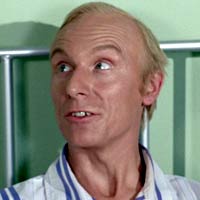 |
|
Image © ITV Studios, 1969 |
| |
Edward Caddick
Character & Episode:
Patient in
You Can Always Find a Fall Guy
Born: 21/06/1931, Finsbury, London, England (as
Edward George Caddick)
Died: 09/06/2017, Australian Capital Territory, Australia
Edward Caddick was a fair-haired actor with a
striking, arguably odd appearance. A capable
supporting player who was seen mainly during the Sixties on
television, he trained as an actor at London's Central School of
Speech and Drama, graduating in 1955. His television debut took
place shortly after, with one of his earliest appearances being on 17th February 1957
when he played a 'Man in a Raincoat' in The King of Iceland,
an Armchair Theatre play. Other notable appearances during the
1960s were in Doctor Who (The Savages), The
Avengers (as a demon barber in Escape in Time) and
Department S (Dead Men Die Twice). He also wrote two
novels for children: Paddy On Sundays (released in 1965)
and Hannah and The Peacocks (1966).
Edward made early Seventies appearances in Callan (1970) and The Ten
Commandments (1971), and soon after emigrated to Australia,
where he worked mainly as a writer and radio actor. He returned to
screen work in the early 1980s, and registered his last credit in a minor role in the family fantasy Playing
Beatie Bow (1986). Edward was married to the actress Loelia Kidd
(1934-2007).
|
|
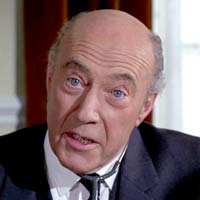 |
|
Image © ITV Studios, 1969 |
| |
Richard Caldicot
Character & Episode:
The Doctor in
Whoever Heard of a Ghost Dying?
Born: 07/10/1908, London, England (as Richard
Cuthbert Giles Caldicot-Bull)
Died: 16/10/1995, London, England
Another busy character actor
with well over two hundred film and television
credits, Richard Caldicot was also busy on radio and in theatre. His
father was a civil servant and Richard was brought up well,
attending Dulwich College. He then appeared in repertory theatre
and on the West End stage from 1928, taking actor training at
RADA, and graduating in 1930. The early days of his career were
spent on the stage and this led to his radio debut in 1938 when
the BBC made a live broadcast of Going Greek from the
Gaiety Theatre on the Strand, London, with Richard being among
the cast. He would start appearing in
films and on television shortly after the Second World War.
It is perhaps for his role as
Commander (later Captain) Povey in the BBC radio series The
Navy Lark (1959-1977) that he will always be best
remembered. Early television series from the Fifties he appeared
in include The Inch Man and Reggie Little at Large.
Later appearances include The Prisoner (Many Happy
Returns, 1967), The Forsyte Saga (also 1967), seven
episodes of the American sitcom The Beverly Hillbillies
as John Faversham (1967-68), UFO (Reflections in the
Water, 1971), Fawlty Towers (Gourmet Night,
1975), and Coronation Street (as Reverend Smedley, 1977).
Another late-career role remembered by many viewers is as the
obstetrician who delivered Betty Spencer's baby in Some
Mothers Do 'Ave 'Em. His career slowed from the Eighties but
he did continue to work up to his death aged 87 in 1995. Among
his final roles was an appearance as Nathan Garrideb in The
Mazarin Stone, the penultimate episode of Granada
Television's prestigious Sherlock Holmes series starring
Jeremy Brett and Edward Hardwicke.
In his home life, Richard married Judith
Mary Gray (1922-2010) in 1951. The couple had one child, a son,
Jonathan Caldicot-Bull.
|
|
 |
|
Image © ITV Studios, 1969 |
| |
Demi Caldren
Character & Episode:
Girl Sitting at Bar in Whoever Heard of a Ghost
Dying?
The only known screen appearance by
Demi Caldren is the one that she registered in this episode
of Randall and Hopkirk (Deceased).
|
|
 |
|
Image © ITV Studios, 1969 |
| |
Joyce Carey OBE
Character & Episode:
Mrs Maddox in Murder Ain't What It Used To Be!
Born: 30/03/1898, Kensington, London, England (as
Joyce Lilian Lawrence)
Died: 28/02/1993, Westminster, London, England
Born into a theatrical family - her father
was Gerald Lawrence (1873-1957) and her mother Lilian
Braithwaite (1873–1948), both well-known stage performers -
Joyce Carey followed in the family tradition and made her
professional stage debut in the West End production of the
exotic melodrama Mr Wu in 1916, when she was 18 years
old. In 1919, Joyce was a regular at Stratford-upon-Avon in a
variety of plays. Later, she became a lifelong friend of Noel
Coward, and featured in many of his stage plays, working as a
stage director for a few of them, over the coming decades. Her career
would span seventy years, and she would still be acting into her
nineties.
Joyce trained at the Florence Etlinger
Dramatic School, graduating in 1916, and made a handful of
silent films over the next few years, starting shortly before
the end of the First World War. However, it was not until 1945
that she started to appear regularly on screen. One of her
best-remembered roles was as Myrtle Bagot, train station buffet
manageress, in David Lean’s Brief Encounter in 1945 – a
film which raised the profile of its lead players Celia Johnson
and Trevor Howard. Among Joyce's other early film appearances
were roles in the classic Blithe Spirit (1945), which
featured Rex Harrison and Margaret Rutherford, The October
Man (1947) and The Astonished Heart (1950). These
early successes helped Joyce carve a niche for herself in the
performing arts, with her specialism being the portrayal of
aristocratic ladies and slightly eccentric, dotty aunts and
mothers. Joyce appeared in many films throughout the Forties and
Fifties, after which time she concentrated her career
predominantly on television work. She guested in such series as
No Hiding Place (The Paying Guests, 1962),
Danger Man (Whatever Happened to George Foster?,
1965) and The Avengers (Homicide and Old Lace,
1969). Between 1968 and 1973 she played Patrick Cargill’s mother
in the popular comedy series Father Dear Father, and
then, between 1976 and 1978, she featured as Lady Alice Bourne
in a major period drama series, The Cedar Tree, which
chronicled the shifting fortunes of a fictional aristocratic
family through the turbulent years of the 1930s leading up to
the Second World War.
Besides her
performing arts work, which also included radio, Joyce wrote two
plays under the pen name Jay Mallory. The first of these,
Sweet Aloes, had runs at British theatres in the mid-1930s,
while the other, A Thing Apart, was staged in 1938. She
was also a well-respected theatrical advisor, and her sage
advice and good judgement was called upon in the casting of
actors and directors in many stage productions. In 1982 she
received the Order of the British Empire.
Joyce Carey died in
her sleep of a heart attack at the ripe old age of 94 in 1993 at
London’s King Edward VII Hospital.
|
|
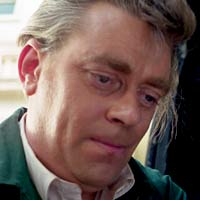 |
|
Image © ITV Studios, 1969 |
| |
Dave Carter
Character & Episode:
Electrician in My Late, Lamented Friend and Partner
Dave Carter's television
credits span from the mid-Sixties to the late Eighties, and
during that time he made more than fifty appearances in a
variety of programmes. He seems to have made his uncredited debut with Gerald
Harper in Adam Adamant Lives! in 1966. He was generally
cast in minor roles, usually without any lines. His last
credited appearance
was in 1989 when he played an injured workman in The Bill.
He is probably most readily recognised for his Doctor Who
roles during the Patrick Troughton, Jon Pertwee and Tom Baker
years, during which he variously played guards, prison officers
and rebels. He was one of the Silurian creatures in Dr Who
and the Silurians and a Primord a few months later in
Inferno. His final credits in Doctor Who - as Sergeant
Duffy in Invasion (of the Dinosaurs) alongside Jon
Pertwee, and as Grierson in The Android Invasion with Tom
Baker - witnessed him finally rising to the heights of having a
character name in Doctor Who!
|
|
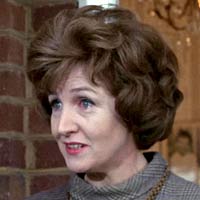 |
|
Image © ITV Studios, 1969 |
| |
Ann Castle
Character & Episode:
Mrs Cavallo-Smith in
Vendetta for a Dead Man
Born: 1922, Newcastle-on-Tyne, England (as Eileen
Middleton Brown)
Died: 2011, Surrey, England
Ann Castle was a supporting actress who made more than
seventy screen appearances, mainly on television, often in
supporting roles in a career which spanned more than fifty years. In
her earliest days as an actress, she used the stage name Eileen
Ridgeway-Brown, adding 'Ridgeway' (her father's name) to her
birthname of Eileen Brown. In 1939, she was awarded silver
medal in the Advanced Certificate (Grade V) Elocution
examinations at Newcastle (LGSM - Licentiate of the Guildhall
School of Music and Drama).
In 1943, by which time she was working
professionally as Ann Castle, volunteered to go abroad to
entertain the troops in the Second World War, as part of the
Entertainments National Service Association (ENSA). She was ill
with pleurisy through Christmas 1943 and when she rejoined her
company after recuperating, she found that the lead actress had
been taken ill and at six hours' notice, Ann had to take her
place in the play Ladies in Waiting. Subsequently she was in the
cast of Saloon Bar and The Circle and played in all sorts of
theatres throughout the Middle East, all of which was excellent
experience gained for a post-war career on the British stage.
In October 1944, she embarked in a Dutch
liner with a hundred fellow artistes and several thousand
troops. nurses and Women's Royal Naval Service (WRNS, often
referred to as 'wrens'). The ship was torpedoed in the Western
Mediterranean and Ann was rescued after four hours in a lifeboat
by a British destroyer and landed at Philippeville (now Skikda),
Algeria. Later, when she was travelling by rail from Alexandria
to Cairo in Egypt, her train was involved in a head-on collision
with a stationary train, but fortunately no-one was hurt.
Her earliest television appearance
dates back to 1946, when the BBC was in the habit of taking
cameras out into the field and filming 'television
presentations' of theatre productions. In Ann's case, this meant
that the production at The Intimate Theatre, Palmer's Green of
Gerald Savory's George and Margaret in which she appeared
as Gladys, was also shown on television.
Over the years, Ann contributed to several well-known
television series, such as
Dixon of Dock Green (1961 and 1968),
Coronation Street (1965 and 1966) and in 1968 she played the
mother in the BBC serialisation of Edith Nesbit's The Railway
Children. Two decades later she appeared in the Midlands
soap opera Crossroads (1984), and in David Wickes'
popular mini-series Jack the Ripper (1988), which featured
Michael Caine and Lewis Collins in the lead roles.
Ann was married to actor Alan Bridges
(1927-2013) and
passed away in 2011.
|
|
John Cazabon
Character & Episode:
The Doctor in That's How Murder Snowballs
Born: 03/08/1914, Hertford (or Watford), Hertfordshire,
England (as John Forde Cazabon)
Died: 22/06/1983, Ealing, London, England
John Cazabon was best
known for his career on Australian radio, though he also amassed more than
eighty screen appearances, which were generally
small, supporting roles and character parts. His parents were Albert Cazabon
(1883-1970), a noted violinist, and Gladys
Cazabon (née Curtin), a professional actress born in Australia,
who featured in the Pickwick Theatre Group in the mid-1930s with
John's older sister Norah (often spelled Nora). John went to
Australia as a teenager in 1927, when his father emigrated there
to become conductor of the Prince Edward Theatre orchestra in
Sydney, New South Wales (a post Albert held with distinction
until 1936).
In Australia, John
studied at a music school and started his career as a writer of
the libretto and lyrics, as well as a playwright and actor, on
stage from 1933 and on radio from 1934. He won two Macquarie
Awards recognising his skills as a radio performer. John
returned to England in the summer of 1951, intending the visit
to be a holiday, but he ended up remaining in his native
country.
John’s first known credit was in the 1949 film drama Eureka
Stockade. Notable small parts followed in the Fifties and
these included the television serial Quatermass II
(1955), Fabian of the Yard (1956), The Adventures of
Sir Lancelot (1956) and Ivanhoe (1958). He also acted
on radio and supplied a variety of character voices to the
enormously popular Journey into Space, written by Charles
Chilton, featuring in all three series that were made between
1953 and 1958.
During the Sixties, John made
supporting appearances in several
well-known series which included Danger Man (four
episodes between 1964 and 1966), The Saint (1966), The
Prisoner (two episodes in 1967 and 1968) and Department S
(1969). He also appeared in one episode of ATV's classic
children's SF series Timeslip as the father of Simon
Randall (Spencer Banks), and would make later television appearances in
productions such as Rooms (1975), Brensham People
(1976) and The Galton and
Simpson Playhouse in 1977.
In his personal life, John married Margery Gielis, with whom he
worked in Australian Radio, in 1937. They later divorced. John's elder sister was an
actress and set designer. He also had a
younger brother, Robert, who was killed in action in 1941.
|
|
Pauline Chamberlain
Character & Episode:
Showgirl in It's Supposed To Be Thicker Than Water;
Chorus Girl in That's How Murder Snowballs
Born: 02/10/1932, West Ham, London, England (as
Pauline Lesley Chamberlain)
Died: 14/01/2021
Although Pauline Chamblerlain made
significantly more than one
hundred screen appearances, all of these were uncredited as she
was mainly seen in the background and had very few speaking
roles. Her identical twin sister Pamela also did some film work
as an extra.
Pauline's career as an extra really developed in the 1950s
and over the following decades she featured in a number of
television series and films. Such films cameos include
Thunderball and A Hard Day's Night. Her television
work included Danger Man, The Baron, The
Prisoner, Department S and even playing a lady in a
pub in an episode of Columbo.
During the 1970s she became
a secretary but kept an agent for extras work, for which she
would be granted days off from her office job. Her most high
profile role was in the BBC situation comedy series Bread
(1986-1990), in which she played a bespectacled member of staff
at the labour exchange, a role that unusually included brief
dialogue. She is seen dancing in Randall and Hopkirk
(Deceased), and she did similar work in the films Oliver!,
Scrooge, Chitty Chitty Bang Bang and Indiscreet,
among others.
Pauline finally retired from
extras work in the mid-Nineties. She passed away on 14th January
2021 having contract Covid-19 whilst in hospital. She was 88.
|
|
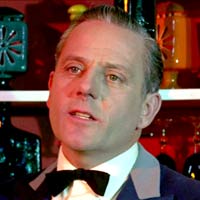 |
|
Image © ITV Studios, 1969 |
| |
Vic Chapman
Character & Episode:
Barman in Whoever Heard of a Ghost Dying?
Vic Chapman (also known as Victor) featured in
many films
and television programmes, generally as a background artiste. Such
appearances include the films A Stitch in Time (1963),
The Gorgon (1964), Inspector Clouseau (1968),
Carry On Loving (1970) and
The House That Dripped Blood (1971). ITC credits are
numerous included
Interpol Calling, The Four Just Men, Ghost Squad,
Danger Man (half-hour and one-hour episodes), The
Saint, The Prisoner and Man in a Suitcase. The
vast majority of his appearances - as was standard practice
regarding film and television extras - went uncredited, and on
occasion he was known to play more than one character in a
single episode. His earliest known appearance was registered in
1950 in the feature film The Wooden Horse. His acting
career continued into the 1970s, with appearances up to 1975
when he featured in Trap, a first season episode of
The Sweeney. It is unclear when Vic passed away, but it
is known that he left a widow.
|
|
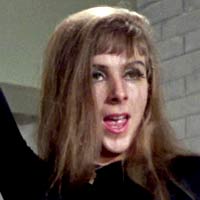 |
|
Image © ITV Studios, 1969 |
| |
Jill Chartell
Character & Episode:
Dancer in It's Supposed To Be Thicker Than Water
Born:
22/11/1944,
Belfast, Country Antrim, Northern Ireland
A full Equity member, Jill Chartell has
enjoyed a long career in International Belly Dancing, appearing
in cabaret all over the world. After schooling at the Royal
Masonic School for Girls, Jill then trained at the
London College of Dance and Drama, has studied many different
dance styles throughout her career and has taught the discpline
for more than thirty years (mostly Arabic style – Traditional
and Modern Egyptian with some Turkish). She has also featured in
a variety of British TV programmes including Randall and
Hopkirk (Deceased) and ITV Playhouse (the episode
Rumour), is a professional tarot card reader (as Gipsy Jill
the Tarot Reader) and is also an in demand after dinner speaker
"with a difference". Her presentations comprise the history of
the belly dance, her life as a dancer (interspersed with comedy
and dance) and psychic development. Jill is also a teacher of
creative dance and drama classes for people with disabilities,
learning difficulties and special needs.
|
|
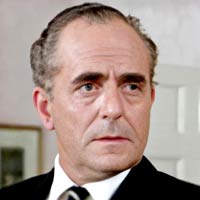 |
|
Image © ITV Studios, 1969 |
| |
Tom Chatto
Character & Episode:
Doctor in My Late, Lamented Friend and Partner
Born: 01/09/1920, Elstree, Hertfordshire, England (as
Thomas Chatto St. George Sproule)
Died: 08/08/1982, London, England
Tom Chatto's parents were James St. George
Sproule (c. 1894-1948) and Sproule's second cousin, Gladys
Muriel Chatto. James, born in Melbourne, Australia, came to
London after the First World War to marry Gladys, whose family
founded the Chatto & Windus publishing house.
Tom trained for the stage at the Royal
Academy of Dramatic Art (RADA). His earliest foray into acting
was with the Colwyn Bay Repertory Company. After serving in the
ranks of the Army, he was commissioned in the Indian Army,
serving for four and a half years in India.
In 1947, he became a radio producer with
the Overseas Recorded Broadcast Services for the Forces. This
led to many broadcasts as a performer, and also on television,
where he was seen regularly, both as an actor (he claimed to
have been the first actor ever to appear on the ATV independent
television channel) and as an announcer for the BBC. He appeared
under the stage name 'Thomas Chatto', taking his mother's maiden
name as his surname.
As well as his work on television and
radio, he was no stranger to the stage, appearing in the West
End in Fings Ain't What They Used T'Be at the Garrick
Theatre and The Thurber Carnival with Tom Ewell. He was
also the assistant director of Once More With Feeling,
which starred Dorothy Tutin and John Neville.
Tom's early roles in feature films were in
productions such as The Girl in the
Picture (1957) and Hammer Films'
memorable Quatermass 2. He also appeared in Oscar Wilde (1960), in which
he played the Clerk of Arraigns. His most notable role is for
playing Guy Hamilton in The Battle of Britain in 1969.
However, his screen work was more focused on television, and
included a role in the Associated-Rediffusion crime series
Murder Bag (1957-1959), two 1958 Sunday Night Theatre
plays for the BBC (The Body of a Girl and Touch Wood),
a recurring role in the 1930s-set soap opera The Cedar Tree
as Parsons, and an association with children's entertainer Rod
Hull (famous for his vicious, silent but deadly Emu puppet) that
led to appearances in Emu's Broadcasting Corporation
(1975), Sing a Song of Emu (1975), Rod Hull and Emu
Sing a Christmas Song (1976) and Emu's Christmas
Adventure (1977).
Tom's wife Rosalind Thompson (1923-2012) was a successful talent agent. The
couple had two sons, one of whom, Daniel (born 1957), became an
actor.
|
|
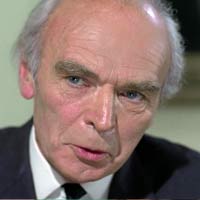 |
|
Image © ITV Studios, 1969 |
| |
Basil Clarke
Character & Episode:
Coroner in For the Girl Who Has Everything
Born: 26/09/1913, Hackney, London, England (as Basil Claude
Hudson Clark)
Died: 28/11/2004, Sydney, New South Wales, Australia
Basil Clarke was born in Hackney, London, and raised
in Aberdeen, Scotland, until the age of 11, whereupon in the
mid-1920s, he went to live in New Zealand when his family
emigrated there. On leaving St. Andrew's College, Christchurch,
Basil gained work as a journalist, employed by The Press
in Churchurch. As a young man, he lived briefly in the
Australian cities of Sydney and Melbourne and worked for both
The Sydney Morning Herald and The Age.
He joined the New Zealand Broadcasting
Service in 1938, working on documentaries and plays concerning
the history of New Zealand. During the Second World War, Basil
was on "listening watch", reporting on developments in the
conflict for Radio 2YA, while also acting on Kiwi radio and in
repertory theatre. He left the broadcasting service in 1956 to
tour with the New Zealand Players in Agatha Christie's The
Mousetrap and Peter Ustinov's Romanoff and Juliet.
During his last five years in New Zealand, he was chief
publicity officer for Council of Organisations for Relief
Service Overseas (CORSO), a charity organisation set up in 1944
to tackle Third World hunger. While in post, he raised the
charity's profile to such an extent that the New Zealand
contribution to the international Freedom from Hunger
campaign was larger than from any other Western country.
Basil returned to England in 1965,
determined to gain experience in the British theatre. Within a
fortnight of his arrival, he was engaged by Leatherhead
Repertory Company and also successfully auditioned with the BBC,
leading to radio and television work. He appeared in
Man in a Suitcase, The Secret Garden and the ATV soap
opera Crossroads, among others. In the theatre, he was a
member of the Royal Shakespeare Company and toured with them in
Australia and Japan.
At the age of 64, when most people are
thinking of retirement, Basil undertook another challenge,
emigrating to Australia, where he met with great success in the
theatre, his last work being in a tour of A Funny Thing
Happened at the Forum at the age of 85. He also appeared in
a number of popular Australian television series, including The Young Doctors,
Are Young Being Served in Australia and A Country
Practice, in television commercials, and in the feature film Muriel's Wedding
(1994). At 86, he won a best actor award at Tropfest 2000 for
his role in Old Man, his final screen work.
Basil and his wife Hilary brought four
children into the world.
|
|
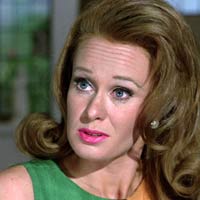 |
|
Image © ITV Studios, 1969 |
| |
Carol Cleveland
Character & Episode:
Laura Slade in For the Girl Who Has Everything
Born: 13/01/1942, Mortlake, Barnes, Surrey, England
(as Carol Gillian Frances Spreckley)
Although born in England,
Carol Cleveland moved with her parentsto the United States as a child. Her father
- David Ralph Anthony Spreckley - was American and in the US Air Force;
he was also an actor. Carol's mother - Ada Eileen Prior (alias
Pat Cleveland) - was a glamour and bit-part player in films, and
Carol would later take the surname from her mother's alias for
her stage name.
Carol was raised
in Philadelphia, Pennsylvania, then San Antonio, Texas, and
later Pasadena, California, where she attended John Marshall
Junior High School and Pasadena High School. She is a former
Miss California Navy and appeared as Miss Teen Queen in MAD
Magazine at the of age 15. However, in 1960 she moved back
to London with her family and studied at the Royal Academy of
Dramatic Art. Soon afterwards, she made her television debut in
A Quiet, Ordinary Woman, a 1961 episode of Dixon of
Dock Green which starred Jack Warner. Coincidentally, one of
her co-stars from For the Girl Who Has Everything,
Marjorie Rhodes, also appeared in this production.
Carol
steadily appeared in a number of well-known series as the
Sixties progressed, most notably The Saint, The
Avengers and Man in a Suitcase. Her appearance in
Randall and Hopkirk (Deceased) saw her replace Judy
Huxtable, who had originally been cast as Laura Slade and who
had not worked out in the part. Carol also appeared in
supporting roles alongside a succession of comedy stars such as
Ronnie Barker and Ronnie Corbett (The Two Ronnies), Eric
Morecambe and Ernie Wise, Spike Milligan and Mike Yarwood. Most
famously though, she was the unofficial "seventh Python" of
Monty Python's Flying Circus (1969 to 1974), initially hired as
an archetypal blonde bombshell. Stage directions for her first
sketch described her as "a blonde, buxom wench in the full bloom
of womanhood." When the team realised that she had a real talent
for comedy, she became their preferred female collaborator and
went on to appear in 34 of the 45 episodes made. Privately
called "Carol Cleavage" by the other Pythons, she called herself
the "glamour stooge". Cleveland also co-starred in all four
Monty Python movies, including the dual roles of Zoot and
Dingo, twin leaders of the maidens in the Castle Anthrax, in
Monty Python and the Holy Grail (1975). Her mother, Pat,
appeared in Monty Python on several occasions, once as a
mental patient with an axe embedded in her head.
By the
Eighties, Carol's career had begun to falter. However, she
has recently appeared in a number of productions including three
short films, and was reunited with the Pythons as a member of
the cast of Monty Python Live (Mostly): One Down, Five to Go,
which played at the O2, London, between 1st and 20th July 2014.
In addition, she has toured with her one woman shows Carol Cleveland
Reveals All and PomPoms Up! and written her
autobiography, PomPoms Up!: From Puberty to Python and
Beyond (Dynasty Press Limited, 2014).
In her personal life, Carol was married to
the actor Peter Brett (1940- ) from 1971 until 1983. Carol has her own website:
www.carolcleveland.com.
|
|
Linda Cole
Character & Episode:
Anne-Marie Benson in Money to Burn
Little is known about Linda Cole, who appears to have made only
a few screen appearances in a short career which started in the
mid-Sixties and came to a close in 1970.
Linda
earliest known screen credit was in the feature film Up the Junction
(filmed 1967, released in 1968), and arguably enjoyed her most
significant role in a film made in 1969 and released in Spain in
1970 -
La Larga Agonía de los Peces Fuera del Agua - in which she
played a beautiful English tourist who entranced the main
character, played by singer-songwriter Joan Manuel Serrat.
In
addition to her role in Randall and Hopkirk (Deceased),
she also featured in the Journey to the Unknown episode
Poor Butterfly for Hammer Films and the BBC drama The
Troubleshooters (two separate and unconnected appearances in
1969 and 1970). The latter
appearance, as Ann Donaldson, marked her last known credit in British television.
|
|
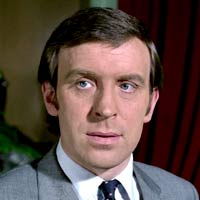 |
|
Image © ITV Studios, 1969 |
| |
Michael Coles
Character & Episode:
Larry Wentworth in For the Girl Who Has Everything
Born: 12/08/1934, London, England (as Ernest Michael
Coles)
Died: 26/04/2005, Chelsea, London, England
Michael Coles worked as a screen actor
for about twenty years. In 1950, at the age of 15, he enlisted
in the Royal Navy as a boy at HMS Ganges, an on-shore training
ship and later stone frigate of the Royal Navy. In 1954 he was
in the Naval Wireless Station in Hong Kong, and five years
later, he was demobbed, upon which he sought out a career in the
theatre.
Michael made his first television appearances in
1960, among which were Three Small Bones, an episode of
Associated Rediffusion's popular crime drama No Hiding Place,
and a BBC
Sunday Night Play, The Ruffians by Alun Owen
(transmitted 9th October 1960). He soon became a familiar face
appearing in such series as Ghost Squad, The Plane
Makers, The Saint, The Avengers and The
Baron. His film appearances include Dr Who and the Daleks
(1965), Dracula AD 1972 (1972) and The Satanic Rites
of Dracula (1973).
After the mid-Seventies, his career
petered out somewhat and he made his last screen appearance in
the crime series Dalziel and Pascoe in 1996. Michael
married Maryon Kantaroff (1933-2019), the world famous sculptress, in 1962.
Sadly, the marriage was relatively short-lived and they divorced
in 1966.
|
|
 |
|
Image © ITV Studios, 1969 |
| |
Patrick Connor
Character & Episode:
Harry in Murder Ain't What It Used To Be!
Born: 06/08/1926, Margate, Kent, England
Died: 22/07/2008, High Peak, Derbyshire, England
Patrick Connor was a hard-working actor
often seen in minor supporting roles. The son of Patrick and
Alice Connor, he was in part educated at Chatham House Grammar
School in Ramsgate. He was employed for some
time as a BBC studio manager, after which he progressed to the
professional stage, truncating his real name to work as Pat
Connor. He would drop this stage name in the mid-1950s and acted
under his real name from that point onwards. His early extensive
stage career included work with the Tavistock Repertory Company
and other rep companies in England. Subsequently, he toured in
Wedding in Paris (from 1955 to 1956) and featured in
several West End productions, such as Alfie in 1963.
Patrick came to television in the early
Fifties, with early roles in the BBС plays Whistling in the
Dark, The Goldfish in the Sun (both in 1953) and
Caesar's Friend (1954). His participation in the comedy
series Nathaniel Titlark in 1956 was noted as being his
fifteenth TV appearance. He would go on to contribute to many
notable series including Quatermass and the Pit (two
episodes in 1959), Danger Man (two episodes in 1965), two
episodes of The Avengers (1961 and 1969), The
Persuaders! (1971), Z Cars (1962 and 1972) and The
New Avengers (1976). His final screen credit was in police
series The Bill in 1990. Patrick also participated in
radio productions, including the popular BBC soap opera The
Archers.
On the big screen, he was seen in notable
films such as One Good Turn (1955), I Was Monty's
Double (1958), The Headless Ghost (1959) and
Exodus (1960), although in each of these four films he did
not receive an on-screen credit. However, he was credited in
such films as John and Julie (1955), Slade in Flame
(1975) and Eye of the Needle (1981), which starred Donald
Sutherland. His last two screen credits were in Brazil and
Lifeforce, both of which premiered in 1985.
In his personal life, Patrick was married
to actress and writer Joyce Marlow (1929-2017), from 1955 until
his death. The couple had two children, Nicholas, born in 1961,
and Julian, born in 1966.
|
|
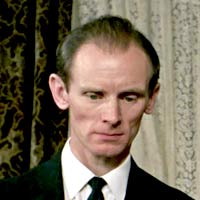 |
|
Image © ITV Studios, 1969 |
| |
Douglas Cooper
Character & Episode:
First Man at Séance in The Trouble With Women;
Audience Member in That's How Murder Snowballs
Douglas Cooper appeared as an uncredited extra in all
of his film and
television roles, with the exception of Dragonslayer
(1981), in which he was credited as Urlander. Douglas is recorded as having
figured in such television programmes as The Human Jungle
(Struggle for a Mind, 1964), The Avengers (The £50,000
Breakfast, 1967, in which he
portrayed a mourner at a funeral) and, of course, his two roles
in Randall and Hopkirk (Deceased). He also made appearances in films
including the Boulting Brothers' comedy Heavens
Above! (1963) and The Crimson
Permanent Assurance (1983). The latter is a sequence in
Monty Python's The Meaning of Life.
|
|
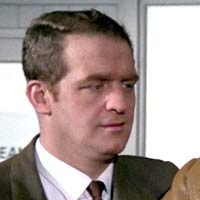 |
|
Image © ITV Studios, 1969 |
| |
Billy Cornelius
Character & Episode:
Albert in A Sentimental Journey
Born: 18/08/1934, London, England (as William
Cornelius)
Upon leaving school, Billy Cornelius
started his professional life by working for a printing company. He
was also a keen boxer and temporarily became a professional in
1958 in the light heavyweight division. He had nine professional
fights, winning five. Afterwards, he found work as an extra and
stuntman in film and television, and also worked in pubs around
London as a bouncer.
His first screen appearance came in 1962
and this quickly led to a succession of notable minor roles.
These included the Doctor Who serial The Space Museum
(1965), in which he played a Morok guard, and The Illustrious
Client, a 1965 episode of the BBC's Sherlock Holmes
adaptations which starred Douglas Wilmer as the Great Detective.
His breakthrough into film work came in
1964. He was cast in Carry On Cleo, and this uncredited role as
companion to Jim Dale's character Horsa would be the
first of nine appearances he made in the celebrated film
series. His best remembered Carry On role is undoubtedly
as Oddbod Junior in Carry On Screaming (1966). He also featured
in The Avengers and figured occasionally in Armchair
Theatre
during this time.
Later roles included appearances in Randall
and Hopkirk (Deceased) (1968, screened 1970), Callan
(1970) and children's series Ace of Wands (also 1970).
His last Carry On film was Carry On Behind in 1975, playing
a man with a salad, though he did also appear in three
episodes of Carry On Laughing on television in the same
year. His last screen appearance was in
the early 1980s.
In recent years, Billy has been
helping his son on his fruit stalls in Clapham and Putney.
|
|
 |
|
Image © ITV Studios, 1969 |
| |
Adrienne Corri
Character & Episode:
Laura Watson in All Work and No Pay
Born: 13/11/1930, Glasgow, Lanarkshire, Scotland (as
Adrienne Riccoboni)
Died: 13/03/2016, London, England
Born in Scotland, the daughter of
Lancastrian Olive Smethurst and Italian Luigi Riccoboni,
Adrienne Corri was an actress with a fiery reputation.
Surprisingly, her distinctive auburn hair came from her mother's
side of the family. When Adrienne was young, her parents ran the
Crown Hotel in Callander, Perthshire.
Adrienne graduated from her actor training
school, the Royal Academy of Dramatic Arts (RADA) in 1947. Her first screen appearance was in
a live
BBC television play shortly afterwards, The Infernal Machine (19th October 1947,
with a second live performance two days later), adapted from the
Jean Cocteau play. Later notable roles
included Lara's mother in David Lean's sprawling epic Dr
Zhivago (1965), and Dorothy in Otto Preminger's thriller
Bunny Lake is Missing (also 1965). She also appeared in a
number of horror and suspense films from the 1950s to the 1970s
including Devil Girl from Mars (1954), The Tell-Tale
Heart (1960), A Study in Terror (1965) and Vampire
Circus (1972). Her versatility as an actress led to roles in
such diverse productions as the offbeat science fiction Western
movie Moon Zero Two (1969), a television version of
Shakespeare's Twelfth Night (1970) and as Thérèse
Duval in the film comedy Revenge of the Pink Panther
(1978).
Despite having significant parts
in many films, Adrienne is arguably best known for one of her
smaller roles, that of Mrs Alexander, the wife of writer Frank
Alexander, in Stanley Kubrick's infamous, dystopian film A
Clockwork Orange (1971). Though not originally cast in this
role, she was brought in after the previous actress, reported to
be Bernadette Milnes, left the film. Adrienne's scene, which
depicts her character being gang-raped while her attackers sing
the 1929 song Singing in the Rain made famous by Gene
Kelly in the 1952 film of the same name, is uncomfortable to
watch, even though its graphic content is kept to a minimum.
However, Adrienne's main complaint reportedly concerned the
large number of retakes that Kubrick insisted upon, the sequence
taking four days to be shot to the director's satisfaction.
Her other television credits
include Angelica in Sword of Freedom (1957-58), Yolanda in
the H.G. Wells' Invisible Man episode Crisis in the
Desert (1958), and regular roles in two 1971 series - A
Family at War and You're Only Young Twice. She also
featured prominently in the Doctor Who story The
Leisure Hive (1980) as Mena, alongside Laurence Payne, an
actor whose credits often coincided with her own. For ITC, she
guest starred as the mariticidal Liz Newton in the UFO
episode The Square Triangle (1970), popped across from
the Randall and Hopkirk (Deceased) stage to that of
sister series Department S for The Man Who Got a New
Face, and had earlier featured in two 1965 episodes of
Danger Man and The Night People, an episode of The
Champions. Her final ITC credit was in The Adventurer,
one of the most disappointing and ill-starred series that the
company ever made.
Adrienne was equally at home
playing in the classics of British theatre, giving an
outstanding performance as Lady Fidget in a BBC Play of the
Month, William Wycherley's Restoration comedy The Country
Wife (1977), alongside Helen Mirren. Adrienne made her last
appearance on television in 1992 in an episode of Lovejoy.
During her career she made more than one hundred television and
film appearances.
In her private life, Adrienne was known for
her tempestuous nature (she once reportedly gave a theatre
audience a two-fingered salute in response to a critical
reception) and her choice of friends, among whom were the
notorious East End gangland bosses the Kray twins. She at one
time revealed her wish to have children but not to marry, and
consequently mothered a son, Patrick (who became a museum
director) and a daughter, Sarah (who works as a lighting
designer in France) during a relationship in the mid-Fifties
with the film producer Patrick Filmer-Sankey (1925-1995). In
1961, she changed her opinion on wedlock and married actor
Daniel Massey (1933-1998), who later commented that, "We were
agonisingly incompatible, but we had an extraordinary physical
attraction." Massey had reportedly envisaged a domestic role for
his new wife, but she was not suited to the home life and
insisted on continuing her acting career. The marriage ended in
divorce in 1967. She did not remarry. Adrienne Corri died of a
heart attack at her London home on 13th March 2016. She was 85.
|
|
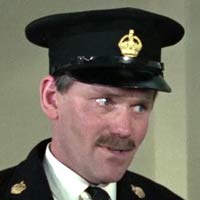 |
|
Image © ITV Studios, 1969 |
| |
Clifford Cox
Character & Episode:
The Attendant in Just for
the Record
Clifford Cox worked mainly on television
during his career, ultimately appearing in more than one hundred
screen productions, though many of his roles were of a minor
nature. His early television career included roles in a quartet
of BBC science-fiction series: Quatermass and the Pit
(1958-1959), The Monsters (1962, in a regular role as
Howard Milton), Out of the Unknown (1969 and 1971) and
Doomwatch (1972). In 1961, Clifford could be seen in a
recurring role as Sergeant Spender in the now-forgotten Granada
drama series Family Solicitor. Other notable screen
appearances that Clifford made during career were in series such
as the Francis Durbridge thriller serial The World of Tim
Frazer (1961), Z Cars (between 1962 and 1973), The
Avengers (1967) and The Onedin Line (1971). His last
television appearance was in the children's historical drama
series Midnight is a Place in 1977 for Southern
Television.
|
|
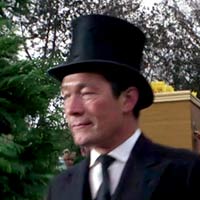 |
|
Image © ITV Studios, 1969 |
| |
Maxwell Craig
Character & Episode:
Undertaker in The Smile Behind the Veil; 3rd
Poker Player in The Trouble With Women
Maxwell Craig was a minor supporting actor
and stuntman. As part of his screen work he occasionally doubled and
performed stunts and was known to have been a stunt double for
Hollywood star Jack Palance at some point.
He made a great many appearances in film and television, all of
which were uncredited, with the exception of Lindsay Shonteff's
Clegg (1970), in which he was credited as Hercules. His
contributions to television include The Avengers, The
Saint, Man in a Suitcase, Space: 1999 and
The Sweeney. His films include Carry On Jack, the
Hammer Horror Hands of the Ripper and Superman III.
He often played gang members, henchmen and people generally in
the background. He died some years ago.
|
|
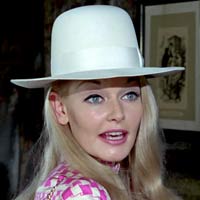 |
|
Image © ITV Studios, 1969 |
| |
Tracey Crisp
Character & Episode:
Dandy Garrison in A Sentimental Journey
Born: 15/04/1944, Walthamstow, Essex, England (as Vivienne Rose Crisp)
Tracey Crisp was an actress and photographic model active
mostly in
the mid- to late-Sixties. She made her screen debut at 22
years of age in the film The
Projected Man in 1966 when she played a character called
Sheila Anderson; she also appeared in the films The Sandwich
Man and Press for Time in that same year. Other notable contributions were to the films
Casino Royale (1967) and Inspector Clouseau
(1968). Her later big screen appearances were in films such as
Toomorrow (1970), Song of Norway and Percy
(both in 1971), the latter being a sex comedy starring Hywel Bennett in the
title role.
Tracey also appeared in a small number of TV series, including a
role in genre favourite Adam Adamant Lives! as Susan in
the episode The Resurrectionists (1967) and children's
football saga United! (also 1967). After her Randall
and Hopkirk role, she only made a handful of subsequent television
appearances, including an episode of Yorkshire Television's The
Root of All Evil? later in 1968.
Tracey first married in her late twenties,
tying the knot with New York clothing executive Murray Garfield
(1917-1990). When Garfield passed away, Tracey left the acting and
modelling professions, remarried, and eventually wound up moving to New York
City, America, after her second husband also passed away. In
2017 she embarked upon writing a memoir of her time in the arts.
|
Section compiled by Darren Senior
Additional research and presentation by Denis Kirsanov and Alan Hayes
|
|
|
Back to Top |
|



